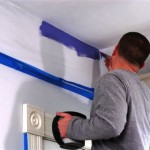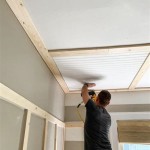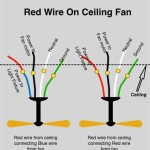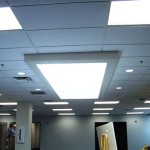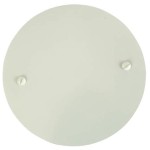Removing Drop Ceiling In Basement
Eliminating a suspended ceiling in a basement can be an extensive but worthwhile undertaking, offering numerous advantages. Basement suspended ceilings often conceal pipes, wires, and other utilities, making servicing and repairs easier. They also provide the ability to improve lighting, insulation, and noise reduction. Here's a detailed guide on how to remove a suspended ceiling in your basement:
Safety Precautions
Before commencing, ensure your safety by turning off the power supply to the basement. Wear protective gear, including safety glasses, gloves, and a dust mask, as the removal process can generate debris and dust.
Removing the Tiles
Basement suspended ceilings generally comprise two types of tiles: fiberglass and mineral fiber. Fiberglass tiles are typically white and have a textured surface, while mineral fiber tiles are usually gray or white and have a smooth finish. To remove the tiles, carefully lift them straight down. Grip the edges and pull gently to avoid breaking them.
Unhooking the Grid
Once the tiles are removed, you will see a grid system supporting them. This grid is usually made of metal or fiberglass. To unhook the grid, locate the wires or clips that connect it to the ceiling joists. Press or pull the release mechanisms to detach the grid.
Removing the Support Wires
The grid may be suspended from wires attached to the ceiling joists. To remove these wires, locate the hooks or clips that connect them to the grid. Carefully unhook or cut the wires using wire cutters.
Exposing the Ceiling Joists
With the support wires removed, you will have access to the ceiling joists. These joists typically run perpendicular to the basement walls. Inspect the joists for any damage or rot. If any repairs are necessary, make them before proceeding.
Insulating the Ceiling (Optional)
If desired, you can improve the insulation of your basement by adding insulation between the ceiling joists. Fiberglass batts or rigid foam insulation are commonly used for this purpose. Cut the insulation to fit snugly between the joists and secure it with staples or adhesive.
Installing New Lighting (Optional)
Once the ceiling is exposed, it's an opportune time to upgrade the lighting. You can install recessed lights, track lighting, or chandeliers depending on your preferences. Ensure that all electrical work is carried out by a qualified electrician.
Finishing Touches
After addressing any repairs, insulation, or lighting upgrades, you can finish the ceiling as desired. Options include painting, installing drywall or wood paneling, or leaving it exposed for an industrial look. Be sure to seal any gaps or cracks to prevent air leaks and dust accumulation.
Benefits of Removing a Drop Ceiling
There are several advantages to removing a suspended ceiling in a basement:
Note that removing a suspended ceiling may expose pipes, wires, and other utilities that were previously concealed. If desired, you can paint these utilities or install covers to improve the aesthetic appeal.
How To Remove A Basement Drop Ceiling Lauren Koster Creative

How To Easily Update An Ugly Drop Ceiling
.jpg?strip=all)
How To Remove Dated Drop Ceiling Tiles Dream Green Diy

Drop Ceiling Vs Bare

How To Replace A Drop Ceiling The Lilypad Cottage

Installing Woodhaven Planks And Hiding Drop Ceiling Grid Sawdust Girl

How To Remove A Drop Ceiling 1905 Farmhouse

How To Remove Insulation From A Basement Ceiling Semigloss Design
.jpg?strip=all)
How To Remove Dated Drop Ceiling Tiles Dream Green Diy

Diy Coffered Ceilings With Moveable Panels Renovation Semi Pros

